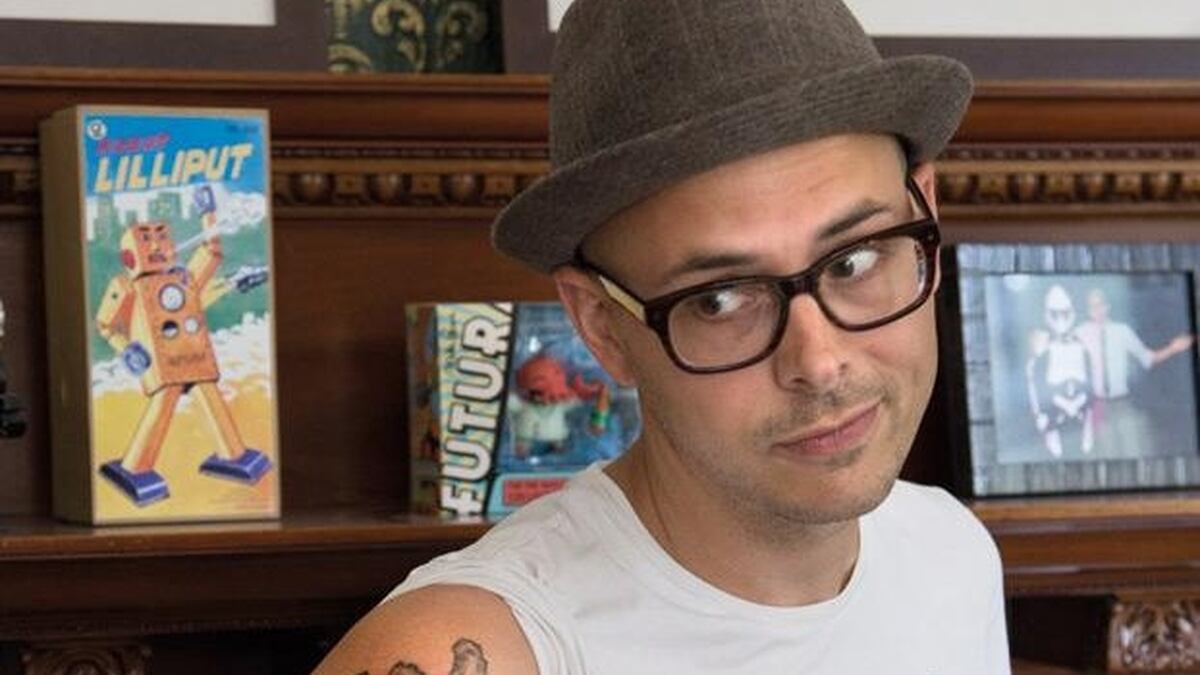Daniel Wilson probably has more movies in the works than any author in Portland—more than Cheryl Strayed, more than Chuck Palahniuk.
His blockbuster novel Robopocalypse was optioned by Steven Spielberg before it was even finished, so he had the rare experience of writing about robotic devices while working with a team of designers from Dreamworks. Brad Pitt signed on to produce a movie based on his story Alpha. Fox also optioned his novella Small Things and his forthcoming novel, The Clockwork Dynasty. (None are yet in production).
Related: Daniel Wilson is Portland’s Best Robot Overlord
A Carnegie Mellon-trained roboticist, Wilson’s prodigious imaginings of the future—as well as alternate pasts—seem made for the screen. And he’s already busting out of it into 3D, working with a company called Jaunt VR to create a wholly virtual-reality movie.
Wilson will be speaking at Portland’s upcoming TechfestNW conference, a gathering of leading thinkers, startups and established companies that has showcased the the Pacific Northwest’s talent and innovation for the past five years. The biggest such conference in Portland, it’ll be held at the Portland Art Museum on March 23-24.
We caught up with Wilson to talk Spielberg, the difficulties of making VR movies, and the future of the past.
What are you working on right now?
I spent the last couple years writing comic books for DC [alternate reality series Earth 2]. Last year, I decided it had been too long since I wrote a novel. It’ll be coming out on July 4 of this year. It’s called The Clockwork Dynasty.
What’s The Clockwork Dynasty about?
Basically, I got really interested in automatons. These are mechanical robots. In the modern era, they are running out of power, cannibalizing themselves to survive. It’s a little Highlander, a little Interview with a Vampire. These immortal creatures are fighting to survive, this race that’s been hiding in plain sight.
Is Steven Spielberg still planning to make Robopocalypse?
Dreamworks did a lot of development on Robopocalypse, they did a lot of iterations of the script, a lot of computer generated models and sequences, and they bought the rights outright. They own it. I don’t think it’s that easy for them to give up on it.
I’ve been moving into writing television and features, also novels and short stories. But no comic books. I feel bad, because I made friends with so many comic book creators—I won’t stop going to their parties.
Given the tone of some of your books, readers could be forgiven for thinking you’re not very cheerful about technology.
I don’t hate robots. I believe tech has potential to transform them into something better. There are risks but it’s always worth it. It think it’s worth betting on humanity. I feel optimistic about humanity, even though its’ challenging sometimes. But Robopocalypse earned that [reputation.]
How does one make a virtual-reality movie?
It’s complete Wild West—not just in games but film. There’s a whole new vocabulary of how to direct the audience’s attention and shape the experiences audiences will have. We’re moving past VR as a gimmick and moving toward VR as an actual medium,, going past all the silly stuff that fools you once.
What do you have to do differently?
What amazed me is how easily I learned to pick up on cues. We’re all trained by television programs for a certain type of interaction, we’re all trained at decoding a certain series of images. There has to be some kind of vocabulary that emerges. So many things are possible in VR that aren’t possible in 2D, if you’re trying to create an emotional experience.
Like what?
I found it interesting that in movie action scenes, you rarely feel threatened, except maybe 28 Days Later. In VR, if there’s a lot of action happening, my viewer may feel threatened. They may be flinching. You’re standing in the room with two people fighting, and the chair comes at you— you want to step out of the way.
And in VR, every extra has to be an incredible actor. There’s no such thing as “The camera’s not on you.” If you want, while people are fighting you can look at the bystanders. If they’re not behaving like actors instead of extras, the scene is ruined.
But if they are acting, it’s so real, it’s so immersive. You have utter freedom where you direct your attention. Or at least, you should have the illusion of that.
TechfestNW will be held at the Portland Art Museum March 23-24, 2017. For information and tickets, go to techfestnw.com.
